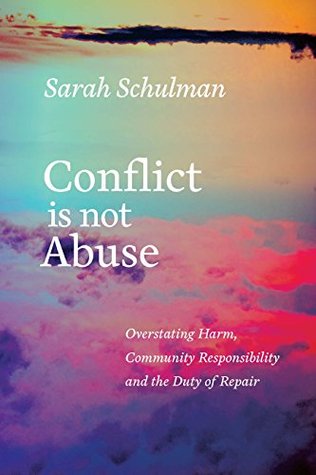More on this book
Community
Kindle Notes & Highlights
Read between
August 23, 2019 - May 15, 2020
The community holds the crucial responsibility to resist overreaction to difference, and to offer alternatives of understanding and complexity.
We have to help each other illuminate and counter the role of overstating harm instead of using it to justify cruelty.
People who are being punished for doing nothing, for having normative conflict, or for resisting unjustified situations, need the help of other people.
While people are punished at every level of human relationship for doing nothing, for normative Conflict and for resistance, simultaneously we have the overwhelming reality of actual violence and real Abuse.
when we are in the realm of Conflict, we can move from the Abuse-based construction of perpetrator and victim to the more accurate recognition of the parties as the conflicted, each with legitimate concerns and legitimate rights that must be considered in order to produce just resolution.
We have power to change the ways we encourage shunning and instead do the work to facilitate communication. Simple shifts in personal behavior and their expressions in political structures of power, produce changing public norms which can make huge differences in individual and collective experiences.
Isa Keatinge liked this
accusations of harm are used to avoid acknowledgment of complicity in creating conflict and instead escalate normative conflict to the level of crisis.
people with social commitments have a special responsibility to intervene to end shunning, facilitate communication, and do the work to reveal complex views of human behavior as we practice self-criticism and stand up to negative groups.
Both seeing and imagining queer desire in another has and can cost us our lives, our homes, our families, and employment. We have been excluded, shunned, imprisoned, and murdered for knowing or believing that desire is reciprocated. Sex workers, especially trans women, often lose their lives expressly because they were desired. And certainly “homosexual panic defense” has been used successfully in courts to justify the murders of gay men, perhaps gay men who had absolutely zero sexual interest in their assailant; or cis women, trans women, or gay men who responded to another man’s wanting.
Queers have been taught all our lives that erotic feeling is wrong and that it will subject us to ridicule, exclusion, and punishment. People who feel erotically towards forbidden objects—like those other than partners to whom they have pledged monogamy, or those who are the wrong age, who work in the same sexually prohibitive workplace, who are transgender, or sex workers, who are generally desexualized by the dominant culture, or who are “off-type” (as in not as butch as one’s femme identity demands in a partner)—can motivate them to hide feelings, even to themselves. Telling the truth of
...more
Part of peace-making is acknowledging that we can’t know everything about ourselves, and sometimes we reveal things to others that we are not ready to accept.
What if she reciprocated or expressed what I was not developed enough to express? What if I became angry, or denied the reality? Blamed her as a substitute for examining myself? What if she tried to help me recognize or be accountable to that reality? Certainly this dynamic of defended refusal is a normative part of many people’s coming to terms with their sexual imaginations and can in fact continue after sexual identity is well in place. Is the act of honest pushback a kind of “harassment,” or is it a gift?
By refusing to talk without terms, a person is refusing to learn about themselves and thereby refusing to have a better life. It hurts everyone around them by dividing communities and inhibiting learning.
When we have terms (e.g., “You stole my money to buy drugs so I will talk to you about this when you have three years sober”), they may not ever be met. But at least there is always a possibility of repair.
Withholding this possibility makes normative conflict or resistance the primary source of injustice between us. It is designed to hurt, and it ...
This highlight has been truncated due to consecutive passage length restrictions.
gets elevated in importance in the blocker’s mind because they are too anxious to negotiate, or are paralyzed by negative fantasy about actually speaking to the dehumanized other.
negotiation becomes impossible. They cannot advance, and anyone who is controlled by their refusal cannot advance. If we can recognize that relationships are necessary to human peace and society, then friends or family would say, “What is the worst thing that could happen if you talk?” or “How can I help the two of you communicate?”
Unfortunately, it is the distorted social norm to see the wish to repair as an assault, and the projection of...
This highlight has been truncated due to consecutive passage length restrictions.
you can decide that I am abusing you. That I am pressuring you, guilt-tripping you, you are too busy to phone, you can’t text, you’re too mad, hectic. You have too many things to think about.
Two people in a situation means two experiences, two points of view, two sources of information, two voices.
sending a person an email that says, “I don’t want to talk to you” and then refusing to discuss the problem at hand, or even to interact at all, resolves nothing. In fact, it creates anxieties,
The real question is: Why would a person rather have an enemy than a conversation? Why would they rather see themselves as harassed and transgressed instead of have a conversation that could reveal them as an equal participant in creating conflict?


